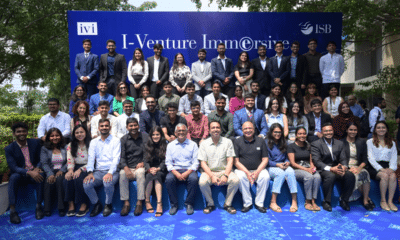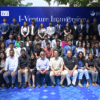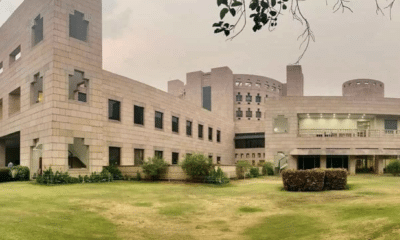News
ISB’s Bharti Institute of Public Policy Launches Centre of Excellence for Aerial and Water Robotics
The Indian School of Business’s (ISB) Bharti Institute of Public Policy (BIPP) is set to pioneer advancements in aerial and water robotics with the launch of the Centre of Excellence for Research in Aerial and Water Robotics for Development and Sustainability (CoE-AWRDS). Prof. Ashwini Chhatre, Executive Director, ISB, is spearheading the establishment of the Centre of Excellence for Research in Aerial and Water Robotics (CoE-AWRDS) at ISB’s BIPP. This initiative is in collaboration with the Indraprastha Institute of Information Technology, Delhi (IIIT-Delhi), and the Delhi Research Implementation and Innovation Foundation (DRIIV).
A Multidisciplinary Collaboration
Establishing the CoE-AWRDS marks a significant step toward addressing critical social development and sustainability challenges. The tripartite partnership aims to leverage robotics to create impactful solutions in disaster management, environmental monitoring, healthcare delivery, and infrastructure inspection.
Prof. Ashwini Chhatre, associate professor and executive director of the Indian School of Business (BIPP), emphasized the centre’s mission: “We will be focusing on enhancing autonomy, sensing, and navigation capabilities. Collaborating with stakeholders, we aim to facilitate research and build practical robotic solutions targeting diverse challenges.”
Key Focus Areas
The CoE-AWRDS is designed to develop cutting-edge robotic technologies with practical applications. Its primary focus areas include:
– Natural Resource Monitoring and Management: Utilizing drones and underwater robotics to track, measure, and manage natural resources efficiently.
– Disaster Response: Developing rapid assessment and intervention technologies in disaster-affected regions.
– Environmental Monitoring: Creating systems to measure and mitigate environmental degradation.
– Agricultural Optimization: Supporting farmers with precision agriculture tools to enhance productivity.
– Remote Healthcare Delivery: Overcoming geographical barriers to provide healthcare in underserved areas.
– Infrastructure Inspection: Enabling efficient and cost-effective monitoring of infrastructure projects.
Building Policy and Capacity
As part of the Memorandum of Understanding (MoU), BIPP and the Indian School of Business will provide expertise in public policy, impact assessment, and partnership facilitation. The institute will also conduct workshops, educational programs, and capacity-building initiatives to spread knowledge about drone technology and underwater robotics. These efforts aim to create a skilled workforce ready to implement these technologies effectively.
A Vision for Sustainability
The CoE-AWRDS underscores the importance of integrating technological innovation with public policy to address global challenges. The centre aims to contribute significantly to sustainable development by combining academic research with practical applications.
This initiative reflects ISB’s commitment to fostering interdisciplinary collaboration and using technology to drive meaningful societal change. Prof. Chhatre’s leadership ensures that the CoE-AWRDS will push the boundaries of robotics and create impactful solutions for pressing real-world problems.
The CoE-AWRDS is poised to become a hub of innovation, shaping the future of robotics in addressing sustainability challenges and setting a benchmark for academic and technological excellence.
As ISB releases e-commerce report, top digital stakeholders discuss the sector’s future at meet












































